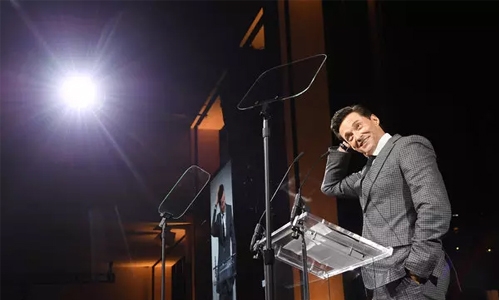Your fake Australian accent is terrible, mate
Running out of gas is one of the most foolish things you can do, but I was guilty of it several times when I was a lean-living university student. That changed, though, when Hugh Jackman was hired as the attendant at my local gas station. He was older than me, clean-cut and hot, an improbably nice star of local high school musicals who was known to date unassuming women. I tried not to stumble over my feet — or, say, into his arms — as he greeted me with a big grin when my Volkswagen Beetle sputtered in: “Jules!” That year, I never ran out of gas.
Today, Jackman, the star of films like “Wolverine” and “Les Misérables,” is widely adored in Australia, even by those who never saw him behind a cash register. He holds a special place in Australian hearts because international success has not made him pretentious. Most crucially, his accent is still intact. Australians have a strong, often irrational suspicion of people who leave the country, succeed and change. Even Paul Hogan, the comedian and actor who played that most iconic Australian caricature, Crocodile Dundee, belied his working-class image after he found global stardom and dumped his wife for his more glamorous — and American — co-star.
Occasional grumbling is heard about the model Elle Macpherson or the singer Kylie Minogue, both of whom have acquired “global” accents. By shifting accents, Australian expatriates are seen to be shifting class and status, indicating a sense of superiority to those who remain in Australia. The quickly acquired faux-British accent in particular has been associated with pretension, or a snootiness that reveals desperation to cover a humble antipodean past, to disown a sunburned, bikini-clad family. Part of our fight against a long-held cultural cringe has been the insistence that we do not need to erase our accents to, say, host a TV show or radio programme.
The problem is, sometimes we do need to adapt the way we speak. When I moved to Manhattan in 2006 to work at a newsmagazine, my accent became a hurdle. “We are cursed by a common language,” my editor was fond of telling me, a line he ascribed to some British statesman, who doubtless looked down his pince-nez at his convict-descended cousins. After he told me that he could not understand 80 per cent of what I was saying, I began to emphasise my R’s and slow my speech. We Australians are used to people being rude about the way we talk.
Winston Churchill was particularly cruel about our accent. He described it as “the most brutal maltreatment that has ever been inflicted on the mother-tongue of the great English-speaking nations.” At best it’s called cute; at worst it’s dismissed as incomprehensible. But given that it is so hard to mimic, perhaps we should be proud of its uniqueness. What Americans — and, to a lesser extent, the British — fail to recognise is that as much as they mock us, they are almost constitutionally incapable of imitating the Australian accent, no matter how often they repeat “G’day, mate!” Even the great Meryl Streep failed to capture it when she portrayed Lindy Chamberlain in the 1988 movie “Evil Angels,” about a woman whose baby is killed in the Australian outback.
The line remains famous for its melodrama — “The dingo’s got my baybee!” — but in Australia it’s also famous as a reminder that even Hollywood’s greatest stars cannot master our way of speaking. Foreign media’s inability to capture how Australians really talk has been back in the news recently, thanks to the new season of the American sitcom “The Good Place,” part of which takes place in Sydney. On social media and in newspapers, Australians are baffled — if not outraged — by hearing American actors mock and mangle the way we speak. This has revived a long-held resentment about the fact that we so often appear as caricatures, fools or comic figures onscreen, with failed attempts to capture our accents that making us seem like bigger idiots.
Why are we so hard to imitate? Maybe part of it is that there’s something deeply laid-back about the Australian accent. One theory suggests that this is because of our habitat: Given the swarms of flies buzzing around the outback, the legend goes, we developed a pattern of speech that would involve only opening our mouths slightly for fear of letting in insects. That’s probably not true, but we can conduct entire conversations while barely moving our lips. In recent years, another startling theory emerged: Drunken convicts are to blame.
Dean Frenkel, a lecturer in public speaking and communications at Victoria University in Melbourne, wrote in 2015: “Our forefathers regularly got drunk together and through their frequent interactions unknowingly added an alcoholic slur to our national speech patterns. For the past two centuries, from generation to generation, drunken Aussie-speak continues to be taught by sober parents to their children.” A horde of linguists dismissed this, but the theory, predictably, got coverage around the world — it’s what people want to think about Australia.
Frenkel is right that our speech is lazy. He thinks we use only twothirds of our articulator muscles. We replace T with D (“impordant”) and drop I’s (Austraya) or make them into oi’s (roight!). But we also add vowels in surprising places (future becomes fee-yu-cha). But the people best placed to mock Australian accents are Australians. Self-parody is a national sport. On Twitter, we lampoon our country by calling it #Straya.
We shorten “Good on you” to “onya” and we stretch out the greeting “mate” to “maaaaaaaate,” the length depending on the depth of affection and time of day. These kinds of joyous subtleties are lost on outsiders, though. And that’s what American television and movie producers need to understand. Next time, hire Australian actors to do Australian accents. Like, say, my mate Wolverine.
Related Posts

